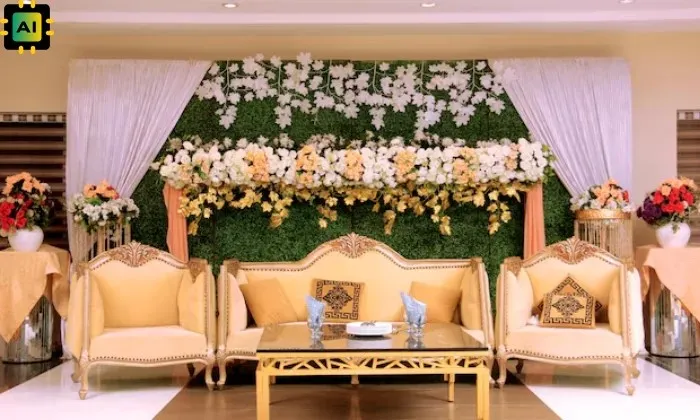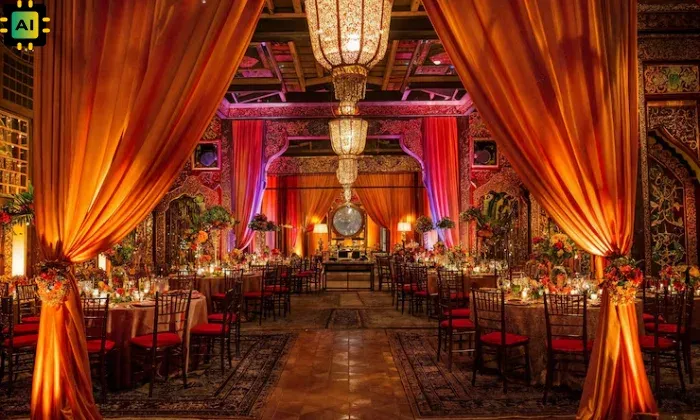Wedding Venue in Jaipur : Dream Wedding Hub
 Wedding Venues
Wedding VenuesJaipur - often called
Pink City - is a city with palaces, courtyards, magnificent continuity, Mughal
architecture, Levant Bazaar and the brilliant royal legacy of Rajasthan. When
couples plan a wedding here, the place is not just "somewhere else";
It is a platform for rituals, memories, paintings, music, family and culture.
Wedding Venue in Jaipur are the canvas you paint your love story on - every
Haldi, Phera, Sangeet, Bidaai, reception, etc. For takes place under its aura.
What is a Wedding Venue
& Why It’s Necessary
The wedding arena is the
physical place where various wedding ceremonies and related ceremonies take
place: engagement/ring ceremony, Mehendi, Sangeet, Haldi, Phera (Sacred Rounds
Around the Fire), reception, etc. in India - especially in Jaipur with the rich
royal and architectural and architecture.
The wedding arena is the physical place where various wedding ceremonies and related ceremonies take place: engagement/ring ceremony, Mehendi, Sangeet, Haldi, Phera (Sacred Rounds Around the Fire), reception, etc. in India - especially in Jaipur with the rich royal and architectural and architecture.
Unique and innovative
venue ideas in Jaipur
Here are some ideas to
make a wedding especially beyond the regular banquet hall or palace balls room:
Heritage Courtyard +
Light and Shade: Use the inner courtyard of the old mansion for Frolikk or
Evening Water. The combination of open sky, bows, flashing lamps, Rangolis
makes it magical.
Terraces of Garden
Palace: Rooftop Gardens at Sunset - Ideal for Music or Cocktails, overlooking
the city lights or forts in the background.
Fort Overlook
Lawn/Terrace: Use the terraces of the forts (or the hotels near the Aravalli
locks) for dramatic view ceremonies with the natural background for the hills
and ramparts.
Meaning: What the arena
gives the ritual and experience
Mandap and Phera: Mandap
should be sacred, visible to all; A beautiful location improves the holiness of
the Phera ritual. The direction of the place (sunrise/sunset), open sky or
canopy affects the feeling of the ritual.
Baraat (Groom's
Procession): The place of the wedding process (through the gate, the courtyard,
the driveway) adds drama and traditional greatness. A palace with a long
gateway or Grand gate provides spectacular wedding processes (with drum dance
etc.).
Mehndi and Haldi: These
rituals often involve colors, water, laughter. An outdoor lawn or garden
provides joy and space. Also reduces damage to decorations, etc.
Music and reception: The
combination of indoor/outdoor elements provides relaxation + procession.
Acoustics mean something to music; Structured rooms are necessary for night
lighting, staging, dance floors, etc.
Hospitality and accommodation: Many guests can travel; The location that provides accommodation to guests (Heritage Hotels) or located near accommodation provides convenience, reduces travel.
When and a way to choose:
Main Checklist
To pick out the proper
vicinity in Jaipur, don't forget:
Weather and weather: Best
time is October to March: Cool, dry, correct for outside activities.
Summer/monsoon can pose challenges.
Number of guests: More
guests require more space, get right of entry to to move, accommodation, etc.
Logistics: Transport,
parking, power deliver, dealer get admission to.
Formal necessities:
Mandap (open or included), fireplace ceremony (Phera), privateness, noise
allowed, noise restrictions (especially if the room is within the antique
metropolis).
Cultural/ritual elements:
For instance, what number of days of activities (Mehendi, Sangeet, Haldi,
Phera, reception) and whether or not a single region will work for all or more
Akharas.
Budget: Location
expenses, meals, decorations, accommodation, travel, backup (eg tents, indoor
showers for rain).
Authenticity and
experience: If you need Royal, Historic Jaipur Touch (Heritage Palace), or
modern-day luxurious, or a hybrid.
Summary of advantages and
disadvantages
Pros:
Location sets the tone
and mood; Make rituals more meaningful and beautiful.
The inheritance offers
stories, visual and cultural depth.
Different places: Indoor
+ outdoors provides flexibility.
Memorable photography
backgrounds create a more engrossing guest experience.
Consolidation:
Arrangement of fewer separate rooms when more functions take place.
Cons:
Cost: Premium locations,
especially inheritance pagouts, can be extremely expensive.
Limitations: Heritage
properties often have rules (eg no loud noises after certain times, limited
changes in decorations, banning fireworks).
Addiction to the weather
for outdoor or semi-out-door places.
Access can be difficult
in old urban areas, narrow roads, parking restrictions.
Supplier restrictions or
the need to use internal suppliers that may not meet your vision.
Why is this important,
especially for Rajasthan/Jaipur wedding
Wedding in Rajasthan does
now not closing in one day. The many rituals: Roka, Mehendi, Haldi, Sangeet,
Phera, Reception, Bidai, etc. - are unfold over numerous days. It is important
to pick out an area (or institution of arenas) which could host several days/events.
The traditional ritual
elements (eg procession via elephant or camel, traditional Rajasthani
people/dance, fireworks, rituals inside the open sky) are stepped forward
through positive places (castle, palace, lawn).
Culture and identity:
Families frequently want to mirror Rajput/Rajasthani Heritage. The area enables
to express it through structure, decorations, hues, rituals (which include
making rangoli, the use of marigolds, replicate paintings, conventional clothes).
For vacation spot
weddings (visitors coming from different towns/countries), their convenience
with accommodation, delivery, spontaneity cases. Jaipur's heritage and resort
resorts frequently provide each venue and accommodation.
Innovative and unique
ideas to improve the arena experience in Jaipur
Mobile Mandap: For each
ritual day, change the location of the manda (for example, garden for mehendi,
terrace for Pheras, Ballroom for Reception), and gives each event a different
attitude.
Variation in time of day:
Turmeric/mehendi in the morning or afternoon in bright sunlight; Music in the
golden hour/dusk; Reception on a starry night with lights and lights.
Water/reflection Use: Use
a pool or fountain that reflects the castle; Set up a platform near water for
reflection; Liquid light or shallow water functions.
Cultural specialization
zone: For example, have a corner with Rajasthani crafts, doll shows or dolls,
Dhol-Dance troops, folk dance artists in breaks.
Theater rises: elephant
or camel procession, vintage wagons or even actors leading the wedding process
or the couple's entrance; The gates lit up, flower arches etc.
Lighting and projection:
Use projection mapping on the castle walls to display images or motifs from the
pair; Use lights, lamps, adventure lights, dramatic interior chandeliers.
ECO/Sustainable space:
Allow organic/local decoration, purchasing flowers, reduces waste, use of solar
struggle, etc.
Planning several turns:
one place for mehendi, another for Phera, another for reception-if it is
manageable-to accommodate different moods, sizes, decorations and guest
current.
Blog Category
Popular Blogs
-min.webp)
Top Bridal Entry Ideas: Unique and Memorable Ways for Indian Brides
5 Jul, 2024

10 Unique Couple Outfit Colors for Sangeet Ceremony
2 Aug, 2025

Marriage Home in Alwar: Dream Wedding Hub
4 Nov, 2025

Harmonies of Love Top Trending Wedding Songs in 2025
9 Oct, 2025
.webp)
Best Wedding Venues in Alwar : Dream Wedding Hub
25 Oct, 2025

Best Wedding Venues In neemrana (alwar)
31 Oct, 2025
.webp)
Best Wedding Venues in Rajgarh : Dream Wedding Hub
31 Oct, 2025

Wedding Venue in Malviya Nagar (Jaipur): Dream Wedding Hub
23 Oct, 2025

Wedding Venue in Bassi (Jaipur) : Dream Wedding Hub
23 Oct, 2025
 (1).webp)
Best Wedding Venues in Alwar
25 Oct, 2025